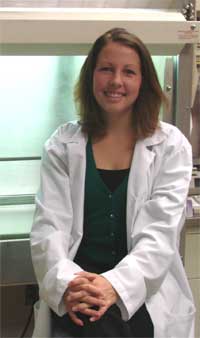
Photo courtesy of Anastasia Manchette.
Played role in responding to accident that killed Sen. Stevens
KINGSTON, R.I. – September 20, 2010 – In an ironic twist of events, Anastasia Manchette, a University of Rhode Island pharmacy student, was unusually prepared for the plane crash that claimed the lives of former Senator Ted Stevens and four others this past summer in Alaska.
Manchette, a South Kingstown resident, has spent a large portion of her pharmacy career and this summer dedicating her time to furthering her knowledge and personal interest on emergency preparedness. Volunteering with the R.I. Medical Reserve Corps, she was able to train and participate in programs designed to assist in public health and emergency situations.
As part of her clinical rotation requirement, Manchette traveled to Kanakanak Hospital in Dillingham, Alaska. Born in Washington, her childhood photos and family videos highlighted the beautiful scenery of the region that her father said was worth visiting.
“I love adventure, hiking, fishing and camping. I knew this would be a chance of a lifetime,” said Manchette who returns to campus in early October.
Kanakanak Hospital provides both inpatient and outpatient services for the more than 20 villages in the region, allowing Manchette the opportunity to participate in a multitude of experiences.
On August 9, a plane carrying former U.S. Sen. Ted Stevens, R-Alaska, and eight others crashed into a mountainside due to harsh weather conditions, including rain and wind gusts, not far from the hospital where Manchette was stationed. Emergency medial services arrived at the scene three hours after the crash and tried to treat the survivors, but nothing could be done until morning when they could be transported down the mountain.
That night, Manchette and others were alerted to the plane crash and started preparing for the incoming victims. The next morning, hospital staff members were given directions to stabilize the victims and prepare them for transportation to Anchorage for further care.
Manchette asked to observe the process in the emergency room rather than stay in the hospital pharmacy so she could get a firsthand account of trauma response.
“I’m very interested in emergency preparedness and procedure,” she said. “I thought it would be a great learning experience.”
Rather than standing back and watching, she responded to directions from doctors and nurses to assist the incoming patients.
“Doctors were using all the extra hands available. I was responsible for cutting clothes, getting blankets and charting the medication prescribed for the patients,” Manchette said.
Along with basic tasks, Manchette was also involved in the intubation of one patient by operating the ambu bag, a manual method of facilitating breathing through an oxygen face mask and pump operated by emergency room personnel, prior to the patients actual intubation.
Although most pharmacists don’t see this kind of patient interaction, Manchette credits her education at URI and interest in emergency preparedness to her success in this traumatic situation. Through patient simulations, she was experienced with regulating oxygen saturation and other patient levels, which played an important role in her ability to make contributions.
Due to the small size and limited pharmacy inventory, when discussing types of medication to use for intubation, Manchette saw the importance of thinking quickly and creatively.
“There are always resources in which you can look up medication and questions, but in an emergency situation, you need to do your best to pull things out of your head and know exactly what you are doing,” said Manchette.
The impact of the plane crash affected the entire United States and sent Alaskans into a state of grief after losing “Uncle Ted”, their senator for more than 40 years, but it also affected Manchette personally and professionally.
“This was my first serious trauma experience and it was hard to hold back tears. You look at the patients and you think about what they’ve been through; how their friends and family died, how they’re struggling to survive and you can’t not cry,” she said. “It was a good experience because it helped me to become a little bit stronger emotionally and professionally. “
The best reward for Manchette was knowing she changed someone’s life for the better.
“This experience really reinforced how important pharmacy is and why what we have to know and what we have to do is so important,” she said. “Because of what the doctors, nurses and I did, I know those patients are going to be all right.”
Media Contact: Dave Lavallee, 401-874-5862

